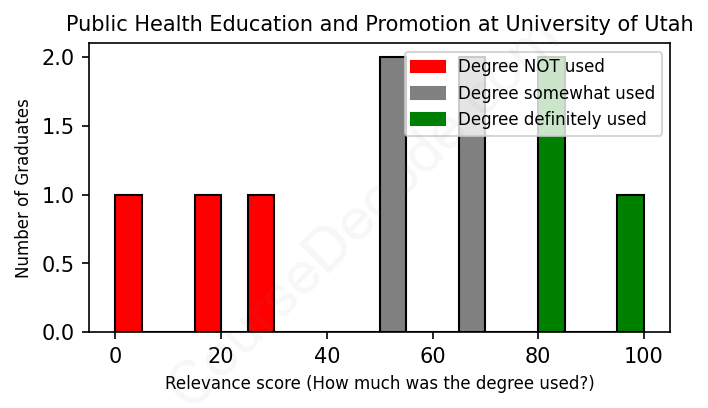
First, some facts. Of the Public Health Education and Promotion graduates from University of Utah we've analyzed , here's how many have used (or NOT used) their degree in their career:

These are estimates based on AI analysis of 10 LinkedIn profiles (see below).
The verdict? Significantly below average. Overall, with an average relevance score of 54%, Public Health Education and Promotion graduates from University of Utah have a much lower likelihood (-13%) of finding work in this field compared to the average graduate across all fields:
And for comparison, here's the chart for all profiles we've looked at across all degrees.
Also, after graduating, 70% of these graduates have pursued further education other than another Bachelor's degree (such as a Masters degree or other), compared to the average across all profiles of 35%. This suggests you may need more than just a Bachelors degree to be competitive as a Public Health Education and Promotion graduate.
See the details:
|
Relevance score: 65% We think this person has gone into a career only somewhat relevant to their degree. We think this person has gone into a career only somewhat relevant to their degree.
DEGREE INFOGraduated in 2019 from University of Utah with a Bachelor's Degree in Public Health Education and Promotion. Also pursued further education since (see below). JOB HISTORY SINCE GRADUATIONRegulatory and Business Coordination Manager UHEAA (Utah Higher Education Assistance Authority) Mar 2020 - Jan 2021 Internal Auditor  UHEAA (Utah Higher Education Assistance Authority) Jan 2021 - Dec 2021 Business Services Intern  University of Utah Health Jun 2021 - Jun 2022 Provider Network Program Manager  Optum Feb 2022 - Present FURTHER DEGREES DONE SINCE GRADUATINGMaster of Healthcare AdministrationUniversity of Utah - David Eccles School of Business 2020 - 2022 ABOUTHealthcare leader with a strong sense of operations improvement and team development. Currently a Network Manager of multiple healthcare systems involved in value-based care. Graduate of the Healthcare Administration program at the David Eccles School of Business- University of Utah. |
The top 10 most common jobs done by the graduates we've analyzed (ranked most common to least) are:
So, when we look at the job trends of graduates from the Public Health Education and Promotion program at the University of Utah, we see a mix of roles that vary quite a bit in relevance to their degree. Many of the positions lean more toward administrative or technical skills rather than directly applying the principles of public health education. For instance, roles like Administrative Assistant, Financial Analyst, and even some medical roles such as Medical Assistant seem more focused on specific tasks that don’t necessarily require the broader public health knowledge they gained during their studies. Even when they do land jobs related to healthcare like Quality Assurance Specialist or Project Coordinator, the emphasis is often more on management or operational tasks rather than education and promotion of health itself.
However, there are definitely bright spots in their career paths. Some graduates have managed to find roles where they can apply their public health knowledge more effectively, such as Clinical Staff Supervisor, Chronic Disease Program Manager, and Emergency Medical Technician. In these positions, they can directly influence health services and community health initiatives. Also, entrepreneurial ventures like Klean Fit Wellness show that some graduates are actively using their degree in meaningful ways that align with public health education and promotion principles. Overall, while not all jobs are closely tied to their field, there are still valuable pathways where these recent grads can make a positive impact in public health.
Here is a visual representation of the most common words in job titles for Public Health Education and Promotion graduates (this is across all Public Health Education and Promotion graduates we've analyzed, not just those who went to University of Utah):

Looking at the career paths of graduates from the University of Utah who studied Public Health Education and Promotion, it seems like there's quite a mix of experiences. Right out of college, many of these graduates have taken up roles that could be considered somewhat outside the core focus of public health. For example, positions like Medical Assistant, Administrative Assistant, and various customer support roles are pretty common. This might suggest that while they have foundational knowledge in health education, they are often starting in roles that don’t directly utilize their degree fully, at least in the early years. You might see some bouncing around between different fields or taking jobs that are more administrative or support-oriented.
However, as they gain experience, there's definitely a trend towards more relevant roles in public health and healthcare management. Within five to ten years post-graduation, many graduates seem to be moving into more specialized and higher-level positions, such as Project Coordinators, Program Managers, or even upper management in healthcare settings. Roles like Chronic Disease Program Manager or Director of Finance show that there's potential to climb the ladder and take on more responsibility in the field. So, while the early career experiences might not always align perfectly with their public health training, it looks like many graduates eventually find their way into positions that are much more relevant to Public Health Education and Promotion. Overall, there seems to be a solid progression for many, even if it takes a bit of time to get there.
Honestly, a Bachelor’s degree in Public Health Education and Promotion, like the one at the University of Utah, typically falls somewhere in the middle in terms of difficulty. It’s definitely not an easy ride, but it’s also not as intense as some STEM degrees. You’ll dive into subjects like health behavior theories and community health initiatives, which can require some critical thinking and real-world application, but if you’re passionate about health and enjoy working on projects and group work, it can be pretty manageable. Just be ready to stay organized and keep up with readings and assignments, and you should be fine! Overall, it's a solid mix of challenging and doable, especially if you have a genuine interest in the field.
Most commonly, in the LinkedIn profiles we've looked at, it takes people 4 years to finish a Bachelor degree in Public Health Education and Promotion.
When looking at the job paths of these Public Health Education and Promotion grads from the University of Utah, it seems like their earnings have varied pretty widely. Some of the graduates started off with entry-level positions, like medical assistants and administrative roles, which typically don’t pay a ton right out of the gate. However, as they've progressed, especially a couple of them who stepped into more managerial positions, it looks like they've definitely started to pull in better salaries. For instance, the one who climbed the ranks to an Associate Chair of Finance and Budget probably makes good money now. Overall, while the early years might not have been super lucrative, many seem to be on a steady path towards making decent cash as they gain experience.
Here is a visual representation of the most common words seen in the "about" section of LinkedIn profiles who have a Bachelor degree in Public Health Education and Promotion (this is across all Public Health Education and Promotion graduates we've analyzed, not just those who went to University of Utah). This may or may not be useful:

Here are all colleges offering a Bachelor degree in Public Health Education and Promotion (ordered by the average relevance score of their Public Health Education and Promotion graduates, best to worst) where we have analyzed at least 10 of their graduates:
| College | Score | Count |
|---|---|---|
 The University of Georgia The University of Georgia
|
82 | 10 |
 University of Florida University of Florida
|
64 | 12 |
 University of Utah University of Utah
|
54 | 10 |